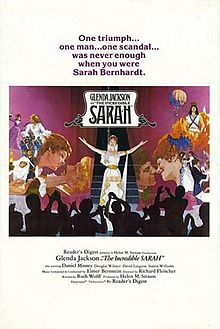
THE INCREDIBLE SARAH
US, 1976, 106 minutes, Colour.
Glenda Jackson, Daniel Massey, Yvonne Mitchell, Douglas Wilmer.
Directed by Richard Fleischer.
The Incredible Sarah is mainly the incredible Glenda with her firm control, her versatility and her dominant metallic articulation impersonating the famed Sarah Bernhardt. She is by turns nervous, tactless, self-opinionatedly brilliant and stage-frightened. She is love, mother, patron, wife, darling and victim of the theatre public. This pleasantly entertaining story is the cinema equivalent of the magazine coverage and it claims only to be a free portrayal of her early years - accessible to a wide audience, melodramatic and romantic, undemanding on cast or audience (and in danger of appearing trite). Within these limits, Glenda Jackson and the art direction and costume departments give us an effective 'showcase' Sarah Bernhardt.
1. How interesting a biography, the insight into the life and career of Sarah Bernhardt? The quality of Glenda Jackson's performance and her impersonation of Sarah Bernhardt? The focus on two great actresses?
2. The importance of the biography in portraying French theatre of the 19th century, the atmosphere of the development of theatre and performances last century? The attraction of the film as a costume melodrama?
3. The Reader's Digest and the production values of the film? A biography, the equivalent of magazine coverage of Sarah Bernhardt and her career?
4. How much knowledge of Sarah Bernhardt did the film presuppose? Interest in her person, career? The times? The film said it was a free portrayal of her early years. was this adequate?
5. The public Sarah Bernhardt and her role in the theatre, the quality of her acting, the plays in which she performed, the genius of her skill and interpretation, her fame and her national and international tours, her admirers throughout the world, her publicity and the fact that she was well known? The experience of rejection by French audiences, her self-assertion and vindication? How well did the film portray this and help the audience appreciate it? A satisfactory portrait of her public life?
6. How much insight into the private Sarah Bernhardt? Presenting her at her initial audition, her nervousness yet her ambition? Her mother's disregard for her career? Her nervousness, mistakes, public gaffs? Her defiance of people and self-assertion? The building up of her career? Her dedication to acting? Her relationships, lovers, Maurice and the way that she mothered him? Her eccentricities and fascination with death eg, lying in coffins? Her tempestuous nature, anger, moods? Her melodramatics? How much insight into an artistic temperament and character?
7. How well did Glenda Jackson embody the private and public lives of Sarah Bernhardt? Did she create a sufficiently French atmosphere for an authentic presentation?
8. The importance of the excerpts from particular plays, especially 'Camille', the use of 'Joan of Arc' at the end and the blending of the theme of the French heroine, her being executed by her own people, her being vindicated? An appropriate excerpt with which to end?
9. The portrayal of Sarah's early years: her presentation at the audition after so many were rejected, her poem and people's appreciation? The conflict with Madame Natalie? Her nervousness in the comic play and her being pushed on stage and being awkward? Her performance before Louis Napoleon and her choice of Victor Hugo's poem? The presentation of nervous energy in Sarah?
10. The people that supported her: Mamselle and her ready support, encouragement, someone to lean on, look after Maurice? Her mother and her reputation, her snobbish attitude towards the stage and get she being a courtesan? The Duke and his influence? How did these people have an influence on Sarah's outlook on life and attitudes?
11. Their sketching of the character of Montigny? His theatrical world, his decision to help Sarah, his continued support despite her moods and her mistakes?
12. The sketching in of the character of Henri de Ligne: his seeing Sarah at the play, his infatuation, her attempted suicide, the love affair, the child, her meeting him and rejecting him and his rejecting her? A sign of her future relationships? was she capable of loving?
13. The contrast with Sardou and his eccentricity, playwriting, enthusiasm for Sarah, continued support?
14. The importance of the Franco- Prussian war sequences, the announcing of war and its impact on everyone at home? Sarah and her career? Her dramatizing herself as a nurse - the Florence Nightingale of France? The importance of her going to the Front and seeing the soldiers returning? The French patriot?
15. The character of Aristide Damala? As a fop, a worldly young man, his relationships, liaison with Marie? His aspiring to fame, Sarah's patronizing him? The importance of their marriage? Within the atmosphere of the successful English tour and her reputation? His being a laughing stock during the tour? Marie and her jealousy and the reports to the French papers? Aristide finding this impossible and the conflicts with Sarah, their melodramatics, his infidelity and decision to leave? Was any other alternative possible for him? The effect on Sarah of the tour, Damala and her love for him, passion? People trying to argue her out of it and her knowing with her head but finding it impossible? Her reaction to Marie, to the stories?
16. The stories as the context for her self-assertion at building her own theatre? Her confronting the crowds, the nature of their abuse both physical and verbal? Her choice of Joan of Arc? How convincing was her subjugating the audience? The applause?
17. How enjoyable is this kind of biography? A feel for a person and the times rather than great insight? Is this sufficient from this kind of film?